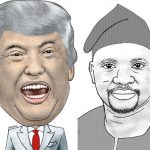SINCE the return to civil rule in 1999, Nigeria’s presidents have usually held periodic chats during which select members of the media are given the opportunity to ask critical and germane questions on how the country is being run. While no phenomenal expose or landmark revelation had resulted from such interactions in the past, they at least bridged a communication gap between the presidents and the people. If former President Olusegun Obasanjo made what some considered an overkill, doing a monthly ritual of usually combative sessions with the media, his successors, the late Umaru Yar’Adua and Dr. Goodluck Jonathan, held quarterly, more measured interactions. In a way, the presidential chats were avenues through which the people could experience their leader’s strengths and foibles first hand.
Without doubt, presidential chats have their merits. Any liberal democratic structure or dispensation could do with free, unhindered communication across all divides so that understanding among different groups in the polity can be guaranteed. This is partly because free flow of communication will always reduce friction in human relationships, including the one between the people and their leaders, and also because it allows the parties involved to appreciate their respective challenges in accomplishing tasks.
Sadly, with the change of baton in 2015 when the All Progressives Congress (APC) took over the reins of power from the Peoples Democratic Party (PDP), the presidential chats have all but ceased, apart from the one granted by President Muhammadu Buhari in December 2015. Since then, mum has been the word and the people have had to make do with the terse press statements issued from the president’s media advisers. This then necessitates asking the question whether President Buhari has been too absorbed in the country’s economic travails to spare a moment of media engagement for the benefit of the increasingly unhappy citizenry.
In our view, it is even during difficult times such as the country is currently in that presidential chats can become a useful tool for dousing the tension in the polity with words of hope and courage. For instance, the issues of economic recession, infrastructure failure and youth unemployment that constitute troubling realities for the people could have been exhaustively addressed by a communicative president. But the presidency’s stonewall silence has worsened the anxieties and confusion of Nigerians.
Though the chats are a mere convention which no president is obliged to conform with, their benefits to the democratic culture since 1999 cannot be easily discountenanced. They have arguably bred some form of mutual understanding between the people and their successive presidents, if only by creating an atmosphere of responsible leadership that considers it imperative to report back to the people who gave it the mandate in the first place. Thus, one key question in the polity now is how to place President Buhari’s seeming diffidence. Could it be an outgrowth of his persona or could it be because presidential explanations for the key issues in the polity are not readily available? Whatever may be the case, the thickened atmosphere of insinuations and speculations cannot be considered healthy, either for democracy or for the well-being of the people.
Some cynics are of the erroneous opinion that the importance of the presidential chat is overrated since it is impossible to determine the president’s sincerity during the interface with the people. However, for obvious reasons, an insincere but communicative president is to be preferred to a reticent or taciturn one. It is certainly much easier to hold such a leader to account.
It is actually difficult to understand, let alone explain, not talking to the people in any form for a whole year without the people feeling ignored or taken for granted. We think President Buhari should not allow the feeling of being ignored or discountenanced to be conveyed to a valued electorate. He should therefore arrange to return the presidential chats without delay.
WATCH TOP VIDEOS FROM NIGERIAN TRIBUNE TV
- Let’s Talk About SELF-AWARENESS
- Is Your Confidence Mistaken for Pride? Let’s talk about it
- Is Etiquette About Perfection…Or Just Not Being Rude?
- Top Psychologist Reveal 3 Signs You’re Struggling With Imposter Syndrome
- Do You Pick Up Work-Related Calls at Midnight or Never? Let’s Talk About Boundaries






